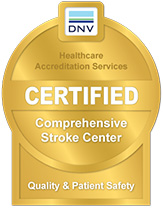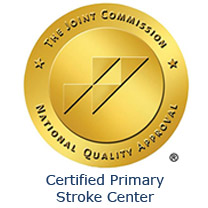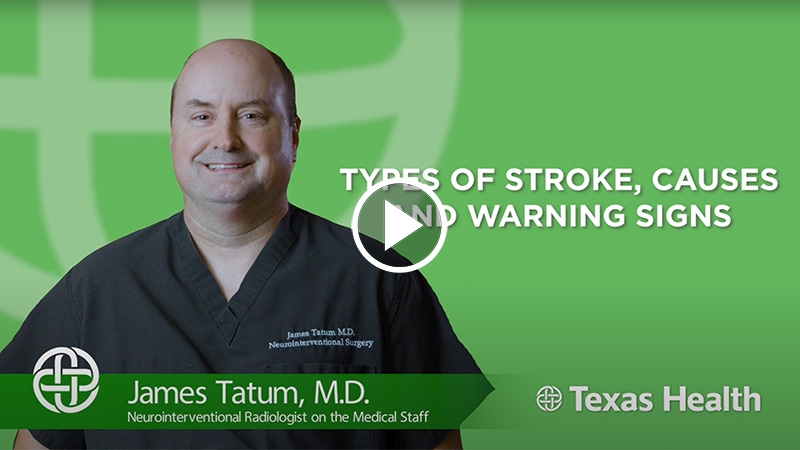

Stroke Warning Signs
B
Balance loss. Person is having trouble balancing or feels dizzy.
E
Eyesight changes. Ask person if they have vision loss, blurry vision, or double vision.
F
Face drooping. Ask the person to smile. Does one side of the face droop?
A
Arm weakness. Ask the person to raise both arms. Does one arm drift downward?
S
Speech difficulty. Ask the person to repeat a simple phrase. Is their speech slurred?
T
Time matters. If you observe any of these signs, call 9-1-1 immediately. Also keep track of the time when symptoms appeared.


-
Comprehensive Stroke Centers
Texas Health’s Comprehensive Stroke Centers in Plano, Dallas and Fort Worth offer advanced stroke capabilities and take a multidisciplinary approach to care with dedicated medical professionals including a neurovascular medical director on the medical staff and nurses and therapists specifically trained in stroke care. Comprehensive Stroke Centers are required to be equipped with advanced technology, including updated facilities and telemedicine technology. Learn more about Texas Health Stroke Centers.
Accredited Comprehensive Stroke Centers


-
Primary Stroke Centers
Texas Health hospitals that have received certification as a Primary Stroke Center are able to participate in the Dallas Area Stroke Network. The network sends stroke patients to hospitals that have met high quality standards for stroke care. Learn more about Texas Health Stroke Centers.
Accredited Primary Stroke Centers
- Texas Health Allen
- Texas Health Alliance
- Texas Health Arlington Memorial
- Texas Health Denton
- Texas Health HEB
- Texas Health Southwest Fort Worth
- Texas Health Huguley


-
Stroke and Neurovascular Conditions Treated
We provide care for a wide scope of stroke and neurovascular conditions such as:
- Ischemic stroke
- Transient ischemic attack (TIA-often called a mini-stroke)
- Hemorrhagic stroke
- Aneurysms
- Arteriovenous and vascular malformations
- Cerebral sinovenous thrombosis (venous stroke)
-
Advanced Stroke Imaging
Our stroke centers offer the full range of diagnostic equipment, tests and scans to deliver appropriate care for each patient. Advanced stroke imaging software, like RAPID and Viz.ai, help physicians on the medical staff quickly evaluate the damage caused by a stroke and determine function that can be saved. Imaging technology will quickly analyzes the CT and MRI scans of patients having acute strokes to optimize care decisions. The software is fast and automated which can lead to increased speed-to-decision time - generally less than two minutes for actionable results.
-
Treatments
The physicians on the medical staff recommend treatments that can include clot-busting drugs, procedures like thrombectomy, and other treatments depending on the patient and the time they had a stroke.
Based on the type of stroke you have, you may receive:
- Intravenous thrombolytic - clot busting medication
- Thrombectomy
- Neurointerventional or Minimally Invasive embolization of aneurysms and vascular malformations
- Neurosurgical interventions, elective and emergent for treatment of any neurovascular condition
- Intracranial aneurysms — clipping and coiling
- Tumor embolization
- Carotid artery angioplasty and stenting
-
Research
Researchers at Texas Health are dedicated to studying stroke, its risk factors and stroke care. Participants often include our patients as well as others who are at risk or have had a stroke.
START — Optimal Delay Time to Initiate Anticoagulation after Ischemic Stroke in Atrial Fibrillation. Prospective study to look at the right time to begin medications that will prevent blood clots in those with an irregular heart rhythm. This study focuses on patients with a stroke caused by a blood clot.


-
Rehabilitation
Stroke is considered a brain injury, and rehabilitation focuses on recovery from day one. Therapists at Texas Health facilities work closely with each patient to develop a personalized rehabilitation plan. The stroke centers also include access to support groups, education and prevention programs.
Our programs share rehabilitation and recovery resources, available in inpatient and outpatient settings, to help you get back to living your life.
-
Support Groups
The Journey (Dallas) — In-Person and Virtual
The Journey stroke support group is open to anyone who has been impacted by stroke including survivors, caregivers, family members, and friends. The support group is offered in a hybrid format via Zoom and in-person at UT Southwestern Medical Center.
Date/Time:
Fourth Thursday of every month at 4:00 p.m. Virtual attendees will be emailed a link to join. Please see directions below if joining in-person:Location:
Cancer Care Outpatient Building – Room NM 02.966
6202 Harry Hines
Dallas TX 75390(Directly across the street from William P. Clements Jr. University Hospital)
Parking/Wayfinding:
Room NM 02.966 – Down the first hallway after the Gift Shop if entering the building from the parking garage. Lot parking will be validated (but not valet).Email to Register: Audra.Rabroker@UTSouthwestern.edu
Stroke Survivors and Caregivers (Fort Worth) — In-Person and Virtual
Join us on the first Wednesday of every month, either in-person or virtually, to discuss common issues patients and families experience after a stroke. The support group is facilitated by a stroke nurse at Texas Health and includes guest speakers followed by group discussion.
Date/Time:
First Wednesday of every month from 3:00 to 4:30 p.m. Virtual attendees will be emailed a link to join. Please see directions below if joining in-person:Location:
Texas Rehabilitation Hospital - Cafeteria
425 Alabama Ave
Fort Worth, TX 76104














